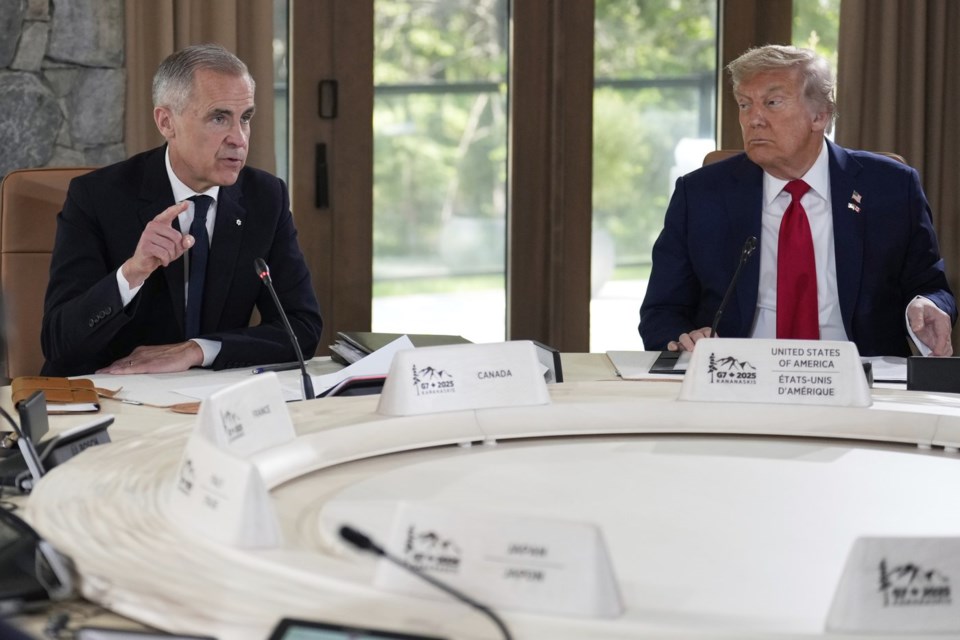OTTAWA — Prime Minister Mark Carney said Monday his move to drop Canada's digital services tax is part of the broader trade negotiation with the United States, even as the White House said Carney "caved" to U.S. President Donald Trump.
Carney's government climbed down on Sunday, and rescinded the tax just hours before the first payment came due, and three days after Trump suspended trade talks with Canada over it.
"It's part of a bigger negotiation," Carney told reporters on Parliament Hill. "It's something that we expected in the broader sense that would be part of a final deal."
But in Washington, White House spokesperson Karoline Leavitt said Carney "caved to President Trump and the United States of America."
Trump, said Leavitt, knows how to negotiate.
"It was a mistake for Canada to vow to implement that tax that would have hurt our tech companies here in the United States," she said.
"The president made his position quite clear to the prime minister, and the prime minister called the president last night to let the president know that he would be dropping that tax, which is a big victory for our tech companies and our American workers here at home."
Carney said Canada and the U.S. restarted their talks Monday morning, and are still aiming for the July 21 deadline the two leaders set when they met in Alberta at the G7 summit earlier this month.
Trump's suspension of trade negotiations with Canada on Friday, triggered a weekend of intense discussions between Canadian ministers and their U.S. counterparts.
Calls were made between Finance Minister François-Philippe Champagne and Canada-U.S. Trade Minister Dominic LeBlanc and their counterparts in the Trump administration. The discussions culminated Sunday night when Carney called Trump to let him know Canada would rescind the tax.
The tax would have hit large tech companies, including Amazon, Google, Meta, Uber and Airbnb, with a three per cent levy on revenue from Canadian users.The first payment — retroactive to 2022 — was due on Monday and could have collectively cost American companies US$2 billion.
Carney said the move would provide businesses with some certainty.
"It doesn't make sense to collect tax from people and then remit them back," he said.
But the last-minute change caused some confusion among companies that were in the process of paying the tax.
Tariq Nasir, a partner at EY Canada’s indirect tax practice, said some companies have given instructions to pay the tax, but the payments were not going through at the Canada Revenue Agency.
Companies that have made the payments are now wondering how to get that money back and how to account for the payments in their quarterly statements, due in the next month.
Business groups on both sides of the border praised the government for moving to eliminate the tax, while critics accused it of capitulating to the U.S.
Bloc Québécois Leader Yves-François Blanchet said Carney campaigned during the election on finding a way out from under Trump's tariffs, and has compromised on multiple things including defence and counter tariffs, but has nothing to show for it so far.
"This is deeply concerning," he said in a social media post.
Interim NDP Leader Don Davies said the decision to end the digital services tax amounts to "pure caving in to Trump and his billionaire friends."
"Canada is a sovereign country with the right to make our own tax laws. Abandoning fair taxation of tech giants is unacceptable appeasement," Davies said in his own social media post.
Davies said that, coupled with Carney's openness to Trump's "Golden Dome" missile defence plan and his sprint to meet the new five per cent NATO defence spending benchmark, "it’s looking more & more like Mr. Carney had his elbows up during the pre-game skate — only to drop them once the game started."
Conservative Leader Pierre Poilievre pointed out that Carney's decision came just days after Champagne said the tax would go ahead as planned.
"Then the Prime Minister put his elbows down and cancelled the tax at the 11th hour," Poilievre said in an online post.
He said in exchange for eliminating the tax, Carney should "insist that the U.S. immediately rescind softwood lumber tariffs. We need to make gains for our workers in these talks."
Entrepreneur Arlene Dickinson, who is a member of the government's Canada-U.S. relations advisory council, said in an online post that she understands the need for diplomacy and only those involved in the negotiations have the full picture.
Dickinson said she's still "disappointed to see the DST paused just hours after standing firmly behind it."
"Backing off so quickly sends a message, whether we intend it or not. And that message matters" to Canadian businesses, taxpayers and "those of us who believe that when Canada stands for something, we hold the line."
However the Canadian Chamber of Commerce called the decision to drop the tax a "savvy" one.
"This tax would have fallen on Canadian consumers, businesses and investors in the form of higher costs and hurt our economy at a critical time," David Pierce, the chamber's vice-president of government relations, said in a statement.
Rick Tachuk, president of the American Chamber of Commerce in Canada, called the withdrawal of the tax a "welcome" move by the Canadian government.
Benjamin Bergen, president of the Council of Canadian Innovators, which represents the Canadian tech sector, said in a media statement his organization has supported the tax but the government's move to eliminate it was the right one.
"With formal negotiations now stalled, rescinding the DST is a strategic move that we hope will help reset the path toward renewed dialogue with the United States," Bergen said.
This report by The Canadian Press was first published June 30, 2025.
Anja Karadeglija and David Baxter, The Canadian Press



